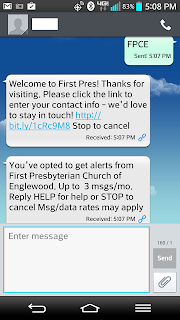At Christmas we have a number of special events where we have large numbers of visitors who will probably escape our existing visitor data collection efforts. So we are implementing a SMS (text message) collection system in time for Christmas.
 It works like this: using a vendor (www.txt180.com) that we selected on the basis of price, we are using keywords on a shared short code. An SMS short code is a 5- or 6-digit number that receives text messages. The keywords we purchased are "FPCE" (for First Presbyterian Church of Englewood) and "FPCFAMILY" (for our Family Ministries).
It works like this: using a vendor (www.txt180.com) that we selected on the basis of price, we are using keywords on a shared short code. An SMS short code is a 5- or 6-digit number that receives text messages. The keywords we purchased are "FPCE" (for First Presbyterian Church of Englewood) and "FPCFAMILY" (for our Family Ministries).A visitor texts "FPCE" to the designated short code and the exchange looks like this (a screen capture from my phone):
Sending the text produces an auto-response that welcomes the person and includes a link to a form on our Web site asking the person to enter their name, email, street address, etc.
 The Web form looks like this on the left.
The Web form looks like this on the left.Using a commercial vendor ensures that we will comply with FTC/FCC requirements for controlling SMS spam.
Using SMS rather than relying solely on paper-based data collection will also allow us to collect data more easily at events that don't take place in our sanctuary.
A one-year subscription to TXT180 cost us $105 for up to 500 outbound text messages per month and includes one keyword. We also paid $27/year for the second keyword.
We don't know how effective this will be, but for $132 it seemed like a good bet.
This fits with our continuing strategy of being "smartphone/tablet-friendly" in church. We're putting up sermon notes as a YouVersion (Bible app) live event. We provide Wi-Fi access in our worship spaces. Devices are increasingly such an integrated part of our lives, we need to help people integrate them into their worship life.